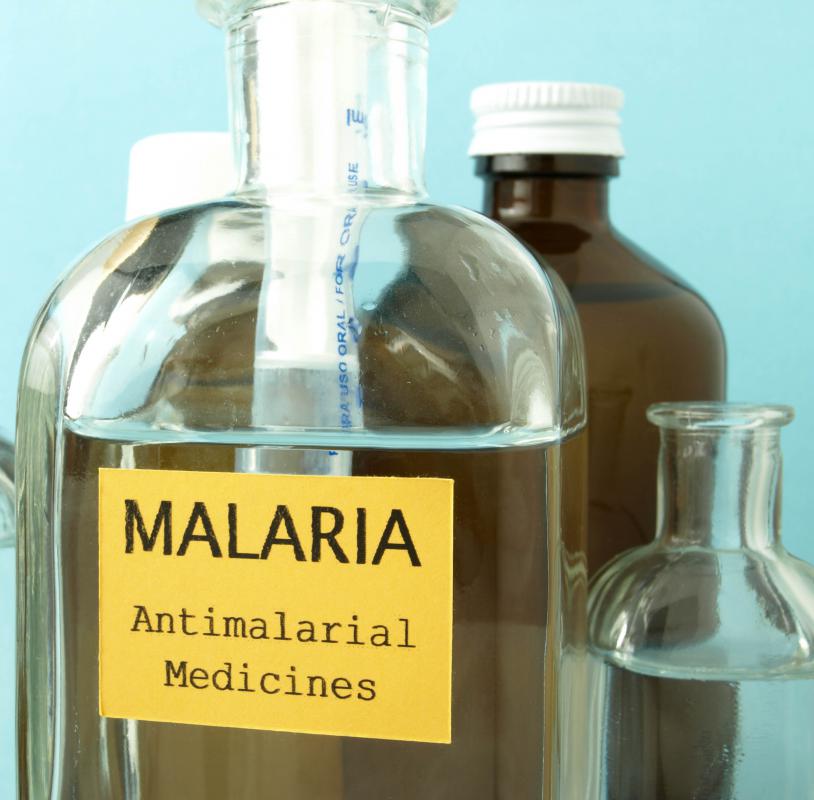At WiseGEEK, we're committed to delivering accurate, trustworthy information. Our expert-authored content is rigorously fact-checked and sourced from credible authorities. Discover how we uphold the highest standards in providing you with reliable knowledge.
What is Chloroquine?
Chloroquine is a drug that has been used extensively to prevent and treat malaria. In some parts of the world, it is still effective. In much of the world, however, resistance has developed among the parasites that cause malaria, particularly against the major strain. Other drugs are now frequently used to treat this disease. Cloroquine also has some mild anti-immune properties, and is used as an antirheumatic product.
Malaria is a devastating disease that kills one million people every year. It is caused by several different species of parasites in the genus Plasmodium. These parasites live in red blood cells (RBC), and are generally spread from one person to another by the bite of infected mosquitoes.

The malarial parasite acts by degrading hemoglobin, the major protein in red blood cells. It does this to obtain amino acids, which are the building blocks of proteins. One complication of this strategy is that hemoglobin contains heme — a nitrogen-containing compound that binds oxygen — which can be toxic in high amounts. The parasite concentrates the heme in crystals, in a specialized cellular compartment called a vacuole, where it does not perturb cellular metabolism.

Chloroquine acts by diffusing into the red blood cells, the parasite, and the vacuole. It becomes trapped in the vacuole, and reacts with the heme crystals. In this form, the crystals cannot have any more heme molecules added. The heme then builds up to a toxic concentration and poisons the parasite.
This antimalarial agent was widely used for decades, despite initial concerns about its toxicity to humans. Resistance has built up to this drug, particularly with the parasite Plasmodium falciparum, the causal agent of the most dangerous form of malaria. There appear to be several mechanisms of resistance, but it is known that the resistant forms of the parasites are very effective at transporting chloroquine out of the cells.

Most of the cases of death from malaria occur in sub-Saharan Africa. There, resistance to malaria is endemic. Chloroquine can be used in parts of the world where drug resistance has not yet been confirmed, however. This includes the Caribbean, Central America, and parts of the Middle East.
Chloroquine can be very effective when given as part of a malarial prevention campaign, for an appropriate area. Travelers are urged to take it about one to two weeks before traveling to a region where malaria is endemic. It is then taken weekly for the duration of the trip, and for four weeks after. For treatment of existing disease, it is usually taken in higher doses several times a day. There are some precautions about taking it, since this drug can be quite toxic.

Patients should have their eyes examined regularly while taking chloroquine. Although blurred vision is common, the medication can be toxic to the eyes and even cause blindness, although this is most usually only a problem with chronic use. Some people suffer from itching, which is sometimes severe enough to interrupt treatment.
Gastrointestinal upset is a common side effect, and is lessened if the drug is taken with meals. The drug cimetidine will exacerbate the effects of chloroquine, possibly leading to toxicity, so it should be avoided. For the sake of safety, patients should consult with a doctor about any drugs or herbal supplements being taken in conjunction with this antimalarial agent.
AS FEATURED ON:
AS FEATURED ON:














Discuss this Article
Post your comments